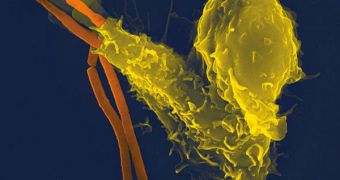It is a widely known fact that individuals who are obese tend to be more prone to developing a host of medical conditions, including diabetes and heart diseases. A new study comes to suggest that one of the reasons why this happens is because excess fat, especially around the abs, can hinder the action of the immune system, essentially turning it against that particular person. The paper also shows that improvements in this condition can be achieved if obese people lose as little as 10 pounds. Scientists say that the difference is visible shortly after, LiveScience reports.
Losing weight can therefore put an off-balance immune system back into equilibrium, the new study would seem to suggest. The experts behind the paper say that each person has his or her own defense systems against pathogens, which protect us from viruses, bacteria and microbes. However, these mechanisms are composed of various types of cells, which need to maintain certain concentrations in regards to each other, if we are to stay healthy. When certain immune cells exceed their recommended values, they can easily cause “malfunctions,” rather than ensuring more protection.
Unfortunately, there is a large number of external factors and triggers that can significantly influence the fragile balance these immune cells naturally find themselves in. Some of these include diet, for example, as well as excessive body fat. “Excess weight disorders now affect 50 percent of adult Australians, with obesity being the major cause of Type 2 diabetes and some cancers,” explains Sydney, Australia-based Garvan Institute of Medical Research professor Katherine Samaras.
The study researcher adds that about a third of the general population in the United States is considered to be obese as well. “The situation has reached crisis point, and people must be made aware that excess fat will affect their immune systems and therefore their survival,” the expert further explains. In a series of experiments the Australian team conducted, it was found that obese people who lost about 13 pounds (6 kilograms) managed to reduce their number of inflammatory immune cells (such as macrophages) back to those found in lean people. These cells are known to have their production bolstered by the presence of excess fat.
“It’s the first time this has been described, and is important because it helps us understand why some people lose weight more easily than others, and that inflammation is involved in regulating the response to [gastric banding] surgery,” Samaras adds. The team published its results in the April 7 issue of the respected Journal of Clinical Endocrinology Metabolism.

 14 DAY TRIAL //
14 DAY TRIAL //